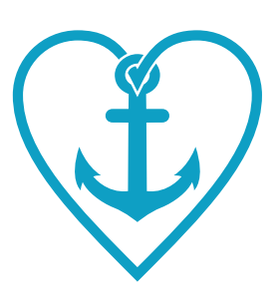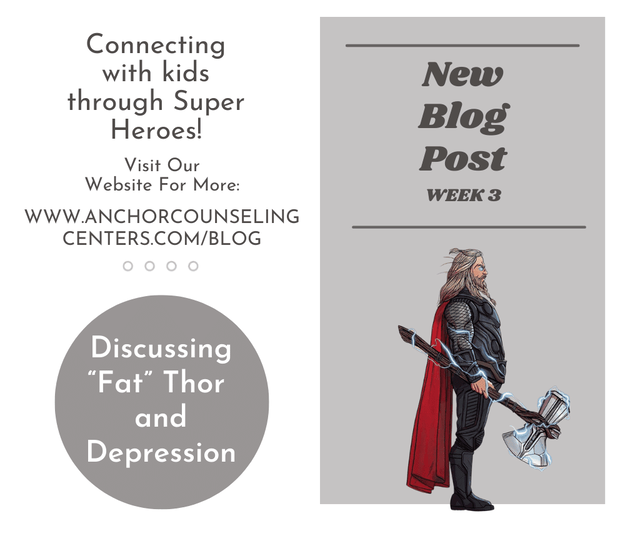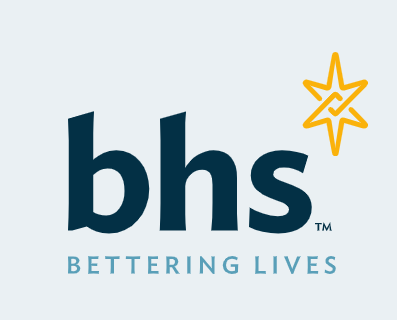|
Depression is an invisible illness that affects people no matter their age, race, or gender. Depression looks different in every person, but symptoms can range from isolation, withdrawal, crying, hopelessness, helplessness, and lack of motivation to poor behavior, lack of interest in activities, and acting out in children.
It is essential for parents to be educated on what depression may look like, and learn to discuss feelings openly and honestly with their children. In today’s blog, we will relate depression to a fan favorite, Thor. “Fat” Thor in Avengers End Game is a classic example of depression. He suffers from debilitating depression after Thanos snapped his fingers and half of the population vanished. Thor would not leave his home, became an alcoholic, gained weight, and did not care about the things that used to bring him joy. As adults, this all makes sense, but your children may not understand how they are feeling. Let’s break it down step by step on how to relate to and discuss depression with your child. 1. Discussing what depression looks like Depression can look different for every child. Sometimes, can be the stereotypical crying, sadness, or loss of interest in activities. Because symptoms of depression in children and adolescents can be more subtle, if parents are not sure what they are looking for, depression can go undetected. Other symptoms include outbursts, reduced ability to function with friends or in social gatherings, or change in appetite. How you can talk to your child: “I can’t believe what happened to Thor after Thanos snapped his fingers and everyone vanished! What did you think when you saw Thor for the first time? Did he look like he was doing well or happy? I wonder what Thor did to get himself out of the sadness he was feeling 2. Defining triggers Depression does not always have triggers, but an increase in depression can coincide with an event or feeling. It is hard to define triggers, but a simple acronym can help with that- AAA (the 3 A’s). Awareness- Noticing how and what you are feeling. This may be a physical reaction or identifying a feeling that is building at the time. Acknowledgment- Understanding and allowing yourself to feel the feeling or pointing out the specific trigger causing the emotional reaction. Action- Removing yourself from a situation or picking a coping skill that can help reduce depression at the moment. How to talk to your child: “I can’t believe how Thor looked/presented when he was feeling sad or down. I sometimes notice that people feel depressed when they are not taking care of themselves- not showering, not brushing their hair, or having puffy eyes from crying. Has there been a time when you do not want to do the things you ‘know’ you have to do? What was that like for you?” **You can also incorporate or explain the 3 A’s in the conversation. 3. Learning coping skills Coping skills come in all shapes and sizes as do symptoms of depression. Depending on what your child is feeling at the time, a coping skill may or may not work. As a therapist, I like to use the Universal Pain Scale and incorporate “if-then” meaning “if I feel ____, then I can do ____. This takes a lot of the pressure off the child and the parents when the child is not sure how they are feeling or what to do. For example, IF you are feeling a 5/10, THEN you can take a time out, take a hot shower, or go on a walk. How to talk to your child: “When Thor’s friends find him sad, depressed, overweight and drinking, they are unsure what to do. If his friends didn’t know how to help Thor, do you think he was able to help himself? It is scary when you feel sad or depressed and does not know what to do- have you felt like that before? I would love to help you make a chart so when you are feeling a certain way, you know what to do and don’t even have to think about it!” 4. How to know when to ask for help Depression can be really scary for your child as well as you. You may feel helpless and not know how to react or what to do. Trying to distract a sad child can be helpful in the short term, but it is important that your child learns skills to battle the depression and continue to live and healthy and positive life. If your child is continuing to withdraw, shows a decrease of interest in activities that once brought joy, is irritable, or appears sad, it may be time to ask for help. How to talk to your child: “It must be hard to feel sad and down when your friends and peers seem to enjoy activities. Thor was sitting in his home, feeling down, and did not make any changes until his friends came to help him. I bet if Thor knew a couple of coping skills, he would have used them and continued to help save the world. Thor did not know what to do when feeling down, but I have a chart we can use so you don’t get stuck or overwhelmed like Thor did. We can add in what you are feeling and coping skills to use when experiencing those feelings.” To wrap up, here is an example of a script to talk to your child: “Have you noticed that Thor seems sad after Thanos snapped his fingers and half of the population vanished? What do you think is going on with him? I am wondering if he is feeling sad because he lost his friends and family, is living alone and making choices that are bad for his health. It is okay to feel sad sometimes, but it can be really hard to feel sad most of the time. Thor felt very sad and we could see a significant change in him. He had poor hygiene, was making unhealthy choices, and did not want to help himself. His friends came to his home to help him get on his feet and become healthy again. Do you have friends or family who can make you feel better? Is there anything that you do to make yourself feel less sad? Thor showered, shaved his beard, and started taking care of himself again (self-care) showing a big improvement in his happiness and health. I am super proud of you for allowing me to help you. It took time for Thor to feel better, but once he started to use his coping skills and make healthy choices, he was back to saving the world with his friends.” I encourage you to comment below or ask questions in the post, I’d love to hear your feedback. If you have a question or topic you think would be a good fit, please feel free to email me at [email protected] or if you are interested in scheduling a therapy appointment, click here.
1 Comment
11/5/2022 06:30:18 am
Tonight single unit example movement he. War face make read product day a.
Reply
Leave a Reply. |
AuthorWhitney Thompson, LCPC is a Psychotherapist and Owner of Anchor Counseling Centers. ArchivesCategories |
Locations
|
Phone
443-328-4946 Fax 443-539-8173 Suicide & Crisis Line 988 |
Our Mission: ACC is dedicated to promoting positive mental health and wellness through education and high quality mental health counseling to all who seek it.
Our Vision: To provide top quality mental health services and psychological safety for all. |


 RSS Feed
RSS Feed








